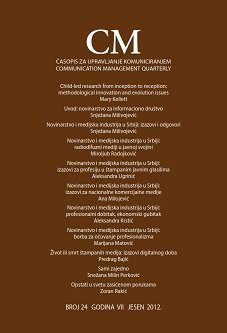Život ili smrt štampanih medija: izazovi digitalnog doba
Life or Death of Print Media: The Challenges of Digital Age
Author(s): Predrag BajićSubject(s): Media studies, Social development, Social Informatics, Marketing / Advertising
Published by: Fakultet političkih nauka Univerziteta u Beogradu
Keywords: print media; information; digital age; electronic mass media; Internet; virtual world; speed; integrated media; interaction; changes;
Summary/Abstract: It is getting more and more common to hear that print media are going to become extinct and replaced by their digital versions. The estimates do not even offer an alternative, but only question the timing. The starting point is the claim that younger generations do not read newspapers, i.e. that they are accustomed to web information accessible via various technical appliances at almost any given moment. It is obvious that the world is undergoing increasing changes and developing rapidly and that the print media are now more that ever endangered by the Internet, which has become “the communication medium” of the 21st century and the point of integration of the whole classical mass media. It is clear that our generation is witnessing the greatest battle of the print media in their long history – the battle of life or death. Yet, no matter how big the threat it poses, the Internet is also a great ally of the print media, having in mind that a modern journalist could not even picture a day without the information acquired via the web. In this paper, the print media refer to newspapers and magazines, given that others belonging to this world may also share the same destiny. The print media have gone a long way from their modest beginnings, to the “golden age” and appearance of the first electronic mass media, which “undermined” their supreme domination, going further to the digital age “ruled” by the Internet. The tasks of journalists remained the same, but everything else changed. They are now more likely to appear as multifunctional individuals meeting requests of an integrated desk far from the old writing, audio or audiovisual specialization. The Internet changed people’s habits. A modern man is not satisfied with getting information at a particular time of the day, but only with it being available at every moment, whenever they feel like it. While in the print mass media there is a deadline for a story (in hours or days), the web news is due – now! Therefore, the print media must be a step ahead of the electronic mass media, which often stop at the news sharing. Furthermore, the web news is never “locked”, but can be edited or updated if necessary, and it is not limited by the number of pages, leaving space for practically indefinite story length. In addition, opportunities for interaction with audience and feedback are unparalleled. Apart from the fact that people’s habits have changed in digital age, the destiny of print media is also quite influenced by the global economic crisis, which has forced people to abandon certain habits, including buying newspapers. This is even easier today, when information is more than ever available and free of charge - in virtual world, yet, often served with unavoidable ads. Whereas, on one hand, there is a decrease in sales, on the other, the costs of production skyrocket. As a result, the print media are getting increasingly dependent on ad commission, thus, allowing more of their influence on the editorial policy and, consequently, appearance of “the topics to avoid”. This is the path to a vicious circle in which independency and objectivity suffer. Should the newspapers become extinct, a lot of professions related to the process of print preparation, printing and distribution would end as well. Nevertheless, it is now hard to say what the world will look like in 2040 when, as estimated, the newspapers would become redundant in its developed parts. After all, a lot of estimates made in the recent past fulfilled to just some extent or failed completely. In any case, it is hard to expect that e.g. daily newspapers, as the most endangered print medium, will fully vanish and that, consequently, other types would follow, i.e. that they will all become redundant. It is more likely that they will be reduced, in a way that minor newspapers will disappear, die out, merge or “join” the majors, as well as that they will become more and more synchronized with the web news.
Journal: CM Komunikacija i mediji
- Issue Year: 7/2012
- Issue No: 24
- Page Range: 151-170
- Page Count: 20
- Language: Serbian

